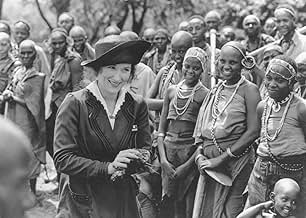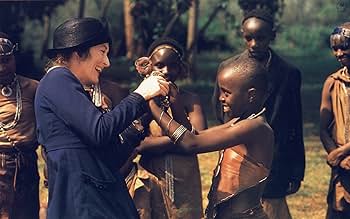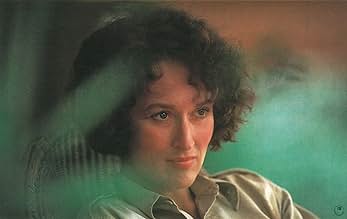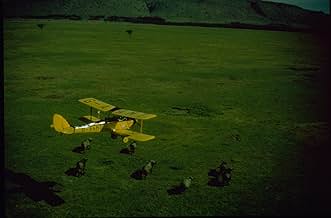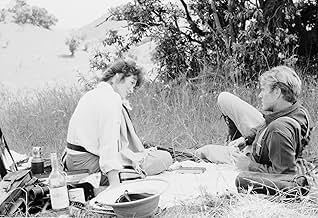Dans le Kenya colonial du 20e siècle, une baronne danoise propriétaire d'une plantation vit une histoire d'amour passionnée avec un chasseur de gros gibier épris de liberté.Dans le Kenya colonial du 20e siècle, une baronne danoise propriétaire d'une plantation vit une histoire d'amour passionnée avec un chasseur de gros gibier épris de liberté.Dans le Kenya colonial du 20e siècle, une baronne danoise propriétaire d'une plantation vit une histoire d'amour passionnée avec un chasseur de gros gibier épris de liberté.
- Réalisation
- Scénario
- Casting principal
- Récompensé par 7 Oscars
- 30 victoires et 31 nominations au total
Avis à la une
Wonderful film. Great in every detail. Director Sydney Pollack captures every nuance of time and place, and the cast is perfection. Meryl Streep is a total wonder as the Danish woman who goes to Africa to find a life but learns about love instead. Robert Redford was much maligned when this film was released in 1985 but now seems quite fine. Michael Kitchen, Rachel Kempson, Suzanna Hamilton, and Michael Gough are all good. John Barry's beautiful score is among the best in film history: a perfect melding of times past and wistfulness and love. Gorgeous African vistas serve as a backdrop for the love story between Streep and Redford, playing real-life characters Isaak Dineson and Dennis Finch-Hatton. But this is not just a movie romance. It's a story about loss: the loss of love, the loss on innocence, the loss beauty. And it's all symbolized by the loss of Africa. War, mechanization, imperialism, westernization, progress are the evils of the early 19th century just as they are today. But the heart of this film is Meryl Streep's flawless performance. She is a wonder.
Watching Meryl Streep in 2011's The Iron Lady and in 1985s Out of Africa gave me two different results. While in both of them, Meryl gave her best shot, the director's approach towards the actress is very different. In Out of Africa, Meryl's character Karen is a hardworking, independent, strong-willed young baroness/plantation worker later author, while in The Iron Lady, she oscillates between an eighty year old dementia-suffering Thatcher and a middle-aged Thatcher, both authoritative.
While I do understand Phyllida's attempt to have Meryl foreshadow others to show Thatcher's dominance, the movie itself became a one-woman show that barely gave a s*** about the supporting cast. While in Out of Africa, Pollock never resorts to showy camera work to highlight Meryl. The camera moves through the picturesque Africa and the beautiful Meryl so naturally as if the cameraman was lost in the beauty of the entire place. While Meryl is a marvel, Pollock himself is a wise man who gave the picture an independent existence. The Iron Lady will always remain Meryl's Iron Lady.
Based on a true story, Out of Africa shows Karen Blixen's life as she adjusts to the African lifestyle while romancing Denys (Redford) and divorcing Bror (Klaus). The opening itself talks of the farm at the foot of the Ngong Hills and is voiced by Streep in a very distinctive accent. Many of her performances, especially the ones where she uses accents, are slightly difficult to accept first but shine later, even though she does sound like Sly Stallone at times, especially when she says in one scene "I want you to COME HOME". Karen marries Bror to retain her title of baroness and moves to Africa. Bror uses her money against her wishes and doesn't take care of her properly. Karen meets Denys and another guy, and invites them to her home. Both the guys are attracted to her but things go awry for one. Denys and Karen fall in love but Denys lives a very different life, independent like Karen but in a nomadic way. Karen runs the entire farm, opens up a school and acquaints and adjusts herself with the Africans.
Pollack has handled the movie tactfully, and the film is enriched by fine performances. The green verdant lands of Africa with the pastoral huts of the Africans on one hand and the lavishness of the Britishers on the other can be seen. There is this lovely scene where the tribe chief tells Karen that only tall children will go to school. When Karen tells him that sending kids would be very wise of him, the African replies that the Britishers have learned to read, but it has not helped them in any way. Still, the farmers hold respect for Karen's caring nature.
Clocking at 2 hours and 40 minutes, Out of Africa is like a landscape of a beautiful bird on its mighty flight over the flowing rivers and the dense forests. My Rating: 8 out of 10
While I do understand Phyllida's attempt to have Meryl foreshadow others to show Thatcher's dominance, the movie itself became a one-woman show that barely gave a s*** about the supporting cast. While in Out of Africa, Pollock never resorts to showy camera work to highlight Meryl. The camera moves through the picturesque Africa and the beautiful Meryl so naturally as if the cameraman was lost in the beauty of the entire place. While Meryl is a marvel, Pollock himself is a wise man who gave the picture an independent existence. The Iron Lady will always remain Meryl's Iron Lady.
Based on a true story, Out of Africa shows Karen Blixen's life as she adjusts to the African lifestyle while romancing Denys (Redford) and divorcing Bror (Klaus). The opening itself talks of the farm at the foot of the Ngong Hills and is voiced by Streep in a very distinctive accent. Many of her performances, especially the ones where she uses accents, are slightly difficult to accept first but shine later, even though she does sound like Sly Stallone at times, especially when she says in one scene "I want you to COME HOME". Karen marries Bror to retain her title of baroness and moves to Africa. Bror uses her money against her wishes and doesn't take care of her properly. Karen meets Denys and another guy, and invites them to her home. Both the guys are attracted to her but things go awry for one. Denys and Karen fall in love but Denys lives a very different life, independent like Karen but in a nomadic way. Karen runs the entire farm, opens up a school and acquaints and adjusts herself with the Africans.
Pollack has handled the movie tactfully, and the film is enriched by fine performances. The green verdant lands of Africa with the pastoral huts of the Africans on one hand and the lavishness of the Britishers on the other can be seen. There is this lovely scene where the tribe chief tells Karen that only tall children will go to school. When Karen tells him that sending kids would be very wise of him, the African replies that the Britishers have learned to read, but it has not helped them in any way. Still, the farmers hold respect for Karen's caring nature.
Clocking at 2 hours and 40 minutes, Out of Africa is like a landscape of a beautiful bird on its mighty flight over the flowing rivers and the dense forests. My Rating: 8 out of 10
Fifty years ago I was living in the Kenya highlands, only a few miles from the old Blixen farm. Not a great deal had changed since the 1920s, the period of the movie, which manages a reasonable re-creation. However, the background is unlikely to mean much to Americans, only confirming unreal stereotypes of the colonial British. Meryl Steep, as we have come to expect, is superb in the part; and in 2003 she co-narrated a wonderful documentary on the remarkable Karen Blixen (Isak Dinesen), to whom in fact she bears some physical resemblance. Robert Redford is badly miscast, and why the producers didn't get one of many superb English actors for the part I can't imagine. As a love story well told in what to most people will be an exotic setting, beautifully photographed, it should be highly rated, justifying its many awards.
It's hard to describe this film. On one hand, it's long and slow; on the other, it's an absorbing story with fantastic acting and breathtaking scenery.
Meryl Streep stars as Karen Blixen, a Danish woman, who marries Bror Blixen and becomes a Baroness. The couple move to Africa in 1913 and start a coffee plantation.
Blixen cheats on her and is away often for business, while she stays at home working the plantation. Ultimately he gives her VD.
She falls in love with Denys Finch-Hatton (Robert Redford). The relationship is frustrating for her -- Denys does not want a commitment, he wanted freedom. When she returns to her native country, she writes about her experience as Isak Dinesen.
The film shows a lot of interesting history: the class consciousness, for one, as Karen was looked down on because of her humble beginnings. Also, it shows Europeans trying to impose their culture on a foreign people.
It definitely portrays how the different tribes saw the Europeans, basically as people who did not belong there.
It also shows the simplicity of the natives, and how their knowledge of their own country was superior. All of this is before World War II and very interesting.
Interestingly, Sikh Indians are brought to the English Gentlemen's club to act as servants and when Karen dares to enter the men's only den, it's the Sikh who is responsible for escorting her out; none of the English "gentlemen" have the balls or nerve to do it. An interesting observation on the English White man's view of the world before World War I.
Many of the lesser characters were real people. Kumante was apparently consulted by the filmmakers. Felicity is based on aviatrix Beryl Markham.
The cast includes Klaus Maria Brandauer, Michael Kitchen, Michael Gough, and Rachel Kempson, all wonderful actors.
Meryl Streep does a beautiful job as Karen/Isak. Robert Redford is miscast as Denys, who is supposed to be a British aristocrat. If he speaks with an American accent, he can't be a British aristocrat. Apparently Redford used an accent but Sydney Pollack made him overdub his lines; he thought they would distract the audience.
I think he should have been encouraged to work on and use the accent so his portrayal could have closer to the real man. As it is, he comes off as miscast -- and American. He also doesn't register as well as he could, given his looks and charm.
The scenery in this film is the true star. So many of us don't have a strong picture of Africa; this film displays its great beauty.
Interestingly, the story of Isak Dinesen was considered for Greta Garbo, and Audrey Hepburn was offered the role before Streep.
Meryl Streep stars as Karen Blixen, a Danish woman, who marries Bror Blixen and becomes a Baroness. The couple move to Africa in 1913 and start a coffee plantation.
Blixen cheats on her and is away often for business, while she stays at home working the plantation. Ultimately he gives her VD.
She falls in love with Denys Finch-Hatton (Robert Redford). The relationship is frustrating for her -- Denys does not want a commitment, he wanted freedom. When she returns to her native country, she writes about her experience as Isak Dinesen.
The film shows a lot of interesting history: the class consciousness, for one, as Karen was looked down on because of her humble beginnings. Also, it shows Europeans trying to impose their culture on a foreign people.
It definitely portrays how the different tribes saw the Europeans, basically as people who did not belong there.
It also shows the simplicity of the natives, and how their knowledge of their own country was superior. All of this is before World War II and very interesting.
Interestingly, Sikh Indians are brought to the English Gentlemen's club to act as servants and when Karen dares to enter the men's only den, it's the Sikh who is responsible for escorting her out; none of the English "gentlemen" have the balls or nerve to do it. An interesting observation on the English White man's view of the world before World War I.
Many of the lesser characters were real people. Kumante was apparently consulted by the filmmakers. Felicity is based on aviatrix Beryl Markham.
The cast includes Klaus Maria Brandauer, Michael Kitchen, Michael Gough, and Rachel Kempson, all wonderful actors.
Meryl Streep does a beautiful job as Karen/Isak. Robert Redford is miscast as Denys, who is supposed to be a British aristocrat. If he speaks with an American accent, he can't be a British aristocrat. Apparently Redford used an accent but Sydney Pollack made him overdub his lines; he thought they would distract the audience.
I think he should have been encouraged to work on and use the accent so his portrayal could have closer to the real man. As it is, he comes off as miscast -- and American. He also doesn't register as well as he could, given his looks and charm.
The scenery in this film is the true star. So many of us don't have a strong picture of Africa; this film displays its great beauty.
Interestingly, the story of Isak Dinesen was considered for Greta Garbo, and Audrey Hepburn was offered the role before Streep.
a film with Meryl Streep and Robert Redford could not be more than a good one. the African landscapes, the music, the cast are virtues in same measure. but the real surprise is the wise balance between emotions, love story, decisions of the lead characters. the science to use a book for explore the nuances of a form of survive far to well- known places. the precise - delicate portrait of relationship and about the status/roots in a different society. and, sure, the high poetry of images - parts of inspired music. a film for remind and discover. small, seductive, bitter details. and for understand a part from a non ordinary biography. more than a good film, a surprising one. for a kind of magic who rebuild a lost form of romanticism and adventure.
Oscars Best Picture Winners, Ranked
Oscars Best Picture Winners, Ranked
See the complete list of Oscars Best Picture winners, ranked by IMDb ratings.
Le saviez-vous
- AnecdotesEarly in the film, Baroness Karen Blixen is introduced to her servants. Although the scene is inter-cut with close-ups and other inserts in the film, the first take was filmed as one long shot that required Meryl Streep to meet and exchange dialogue with several other characters. As soon as director Sydney Pollack yelled "Cut", Streep, wearing a high-collared shirt and snug jacket, yelled "get this thing off of me!" and ripped open her jacket. A large beetle had crawled down the front of the jacket moments after the camera rolled, yet she continued filming the scene. Much of it remains in the final film.
- GaffesDuring the lion attack, Denys pulls an additional two spare cartridges from his belt as a ready reload. However, he carries them with his right hand, his trigger hand, which also is the hand needed to break the action to reload. No experienced double-gun hunter would do this. The two reload cartridges must be carried in the left hand, leaving the right hand free to manipulate the rifle.
- Citations
Karen Blixen: It's an odd feeling, farewell. There is such envy in it. Men go off to be tested, for courage. And if we're tested at all, it's for patience, for doing without, for how well we can endure loneliness.
- Crédits fousEpilogue: "Karen Blixen published her first stories in 1934 under the name Isak Dinesen. She never returned to Africa."
- Versions alternativesNetwork TV version features additional footage not included in theatrical release.
- ConnexionsEdited into A Song of Africa (2000)
- Bandes originalesConcerto for clarinet and orchestra in A (K.622)
Written by Wolfgang Amadeus Mozart
Performed by Jack Brymer Clarinet, The Academy of St. Martin-in-the-Fields
Directed by Neville Marriner
Used Courtesy of Philips Classic Productions, The Netherlands
Meilleurs choix
Connectez-vous pour évaluer et suivre la liste de favoris afin de recevoir des recommandations personnalisées
- How long is Out of Africa?Alimenté par Alexa
Détails
Box-office
- Budget
- 31 000 000 $US (estimé)
- Montant brut aux États-Unis et au Canada
- 87 071 205 $US
- Week-end de sortie aux États-Unis et au Canada
- 3 637 290 $US
- 22 déc. 1985
- Montant brut mondial
- 227 514 205 $US
- Durée2 heures 41 minutes
- Couleur
- Rapport de forme
- 1.85 : 1
Contribuer à cette page
Suggérer une modification ou ajouter du contenu manquant

Lacune principale
By what name was Out of Africa - Souvenirs d'Afrique (1985) officially released in India in Hindi?
Répondre


